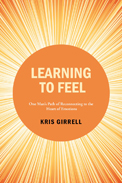
 |
Reading a book authored by a psychologist is like getting free therapy sessions, with no appointment necessary. Such is the case reading Girrell's book, as he goes deep, discussing emotions well beyond sad, mad, and glad. Girrell focuses on bringing awareness to one’s feelings, after making a strong case for why one needs them. "I think of this process as one of remembering. But that word—re-member—lands on my ears like putting us back together. Like we lost a member—an arm or a leg… Re-membering our emotional being might be like rebuilding our fully human selves..."
The author's book is poignant because Girrell is a professional but also a superb writer. The writing is conversational and fluid. He references many well-known professionals, such as Maslow and Brené Brown, but the writing is also personal. He writes, "...enabling readers to find some tools to tap into their own feelings... readers will draw lessons from understanding the issues that have blocked my emotions and made them less accessible to me." One especially valuable topic in the book involves open-mindedness. The author says it best: "The dark night is a transformational passage... refers to old beliefs stripped away and new beliefs not yet formed." He addresses the fear and awakening in forming new ways of seeing things beyond black and white, good and bad.
Girrell also uses humor and take-home questions as tools for self-help. His periodic table of emotions (for the more science types) is creative and funny. It lightens the mood. And the questions at the end of each chapter give readers personal food for thought. After reading this book, readers are guaranteed to come away feeling challenged but armed with the tools and paths forward in their own emotional journeys.